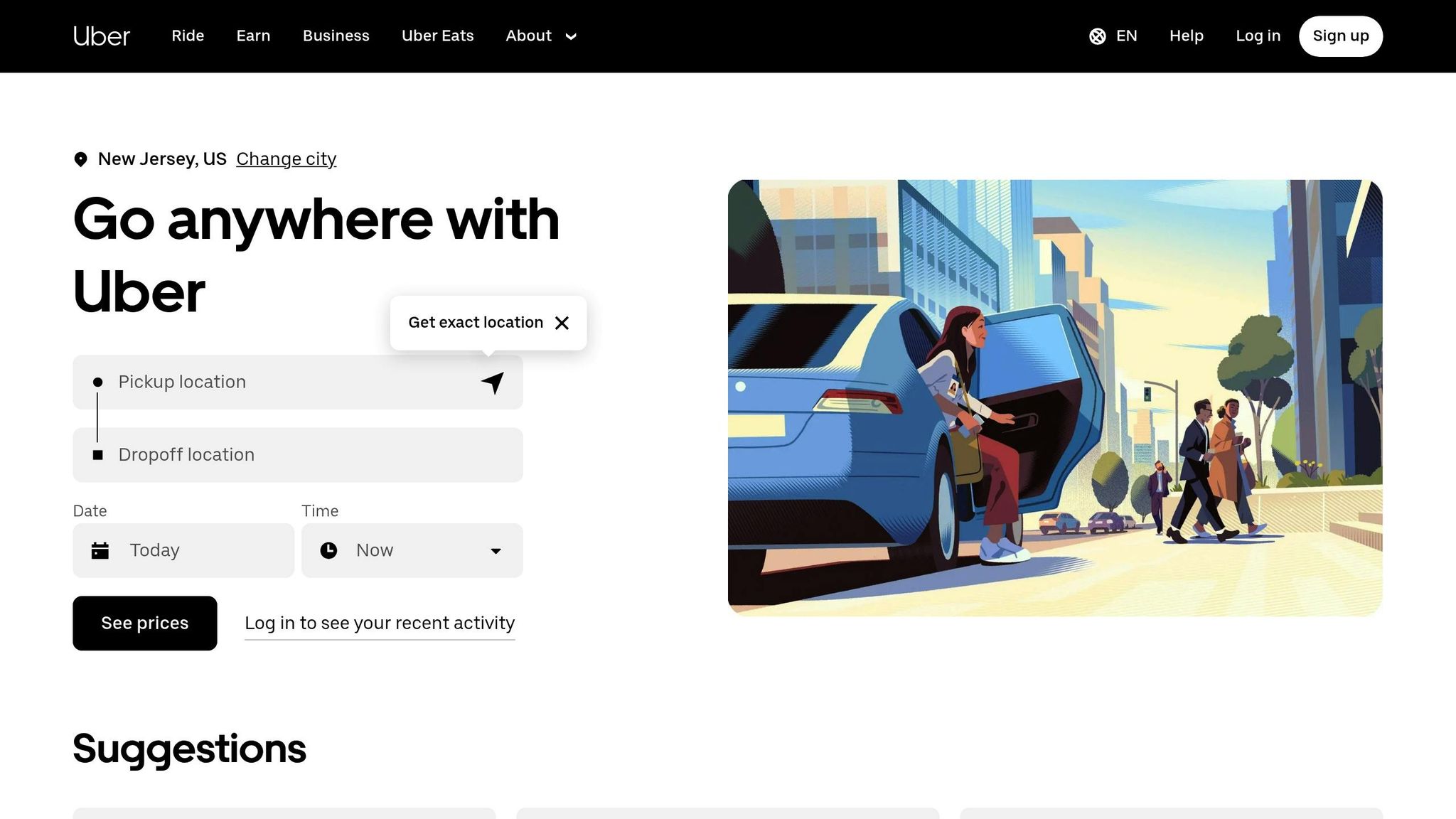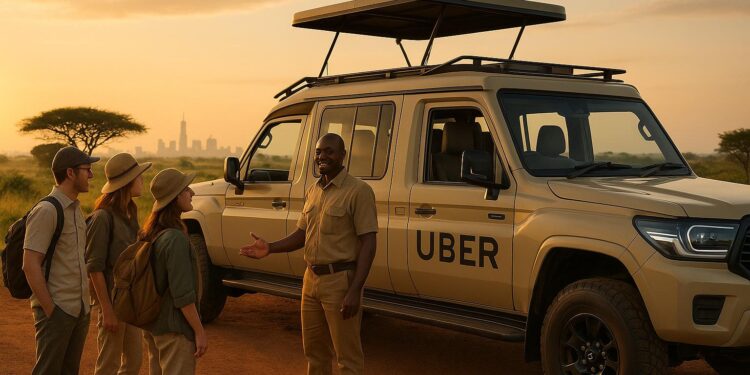Uber has introduced Uber Safari in Nairobi, allowing users to book safari trips directly through the app. This service simplifies safari planning, supports local guides, and offers eco-conscious options. Key features include:
- Day Safari: $200 for up to 7 people (4 hours).
- Night Safari: $320 for up to 5 people (3 hours).
- Licensed guides and safari-ready vehicles.
- Convenient booking and cashless payments via the Uber app.
This initiative collaborates with Kenya’s tourism authorities to ensure safety, quality, and adherence to wildlife regulations. While providing an easier way to experience Kenya’s wildlife, it also creates income opportunities for local operators and promotes responsible tourism practices.
Uber partners with KWS to tap Kenya’s safari tourism with new service

How Uber Safari Works: Booking, Pricing, and Experience
Uber Safari takes the convenience of the Uber app and brings it to the world of safari adventures. You can now choose between two options – Day Safari or Night Safari – and book them as easily as you would a regular ride.
Booking a Safari Through the Uber App
Booking your safari is as simple as opening the Uber app. The Safari option appears alongside regular ride services, making it easy to select your adventure. Once you choose between the Day or Night Safari, the app connects you with licensed tour operators. The process is straightforward, and pricing is clearly outlined. As Imran Manji, Uber’s Head of East Africa and Head of Business Development for Africa, puts it:
"What we have done is take the accessibility and simplicity that people associate with Uber and bring it into this safari space."
Pricing and What’s Included
The pricing for Uber Safari is designed to cover the essentials of a high-quality safari experience. Here’s a breakdown:
- Day Safari: $200 (KES 25,000) per trip for up to 7 people
- Night Safari: $320 (KES 40,000) per trip for up to 5 people [3]
For groups, the cost becomes even more manageable. Splitting the Day Safari among 7 people comes to about $29 per person, while the Night Safari for 5 people averages $64 each.
Both options include:
- Door-to-door service
- Travel in licensed safari vehicles, such as extended-wheelbase Land Cruisers
- Guided tours led by certified professionals
The Day Safari offers up to 4 hours of guided exploration during peak wildlife activity, while the Night Safari provides 3 hours of thrilling nighttime game viewing. However, keep in mind that Nairobi National Park entry fees are not included in the package. These must be paid separately through the official government portal.
"We’ve designed Uber Safari to make the extraordinary accessible." [3]
Safari Experience Highlights
Your adventure begins with a prompt pickup in a licensed safari vehicle. A certified guide will accompany you, sharing insights about the park’s history and the behavior of its wildlife. The Day Safari allows for up to 4 hours of exploration, giving you plenty of time to take in the park’s vibrant ecosystem during its busiest hours. Meanwhile, the Night Safari offers a unique 3-hour experience, showcasing the park’s nocturnal side. Both options prioritize safety and follow all park guidelines, ensuring a responsible and enjoyable outing.
Get ready for an unforgettable experience that blends convenience with the thrill of the wild.
Technology and Eco-Friendly Features
Uber Safari is reshaping Kenya’s safari industry by blending cutting-edge technology with a focus on reducing environmental impact. This modern approach not only makes wildlife adventures more convenient but also aligns with sustainability goals.
App-Based Technology for Seamless Travel
The Uber app, already a household name, now doubles as a gateway to safari adventures. With safari bookings integrated into the app, users can enjoy features like real-time tracking that displays guide and vehicle details, along with estimated pickup times. Payments are cashless and hassle-free, whether through credit cards, digital wallets, or mobile money. The app also simplifies selecting safari options, while GPS ensures your guide can locate you easily – whether you’re in downtown Nairobi or a nearby neighborhood. This tech-driven convenience lays the groundwork for Uber Safari’s eco-conscious initiatives.
Eco-Friendly Safari Options
Uber Safari is exploring the use of electric safari vehicles to minimize carbon emissions. Inspired by its electric vehicle pilot program in South Africa, Uber is considering similar efforts for Nairobi safaris, potentially collaborating with companies like Epurerides to reduce both environmental impact and operational costs. This builds on Uber’s broader green efforts in Kenya, such as the introduction of electric motorbikes in 2023 to cut emissions.
Switching to electric safari vehicles could be a game-changer for wildlife tourism. Traditional safari vehicles are heavy fuel consumers, but electric alternatives not only lower emissions – they also operate more quietly, enhancing the experience for both visitors and wildlife. This quieter, cleaner approach preserves the natural ambiance of the safari, offering an improved and eco-conscious way to explore Kenya’s incredible landscapes.
Safety and Regulatory Standards
Technology and sustainability are paired with a strong commitment to safety. Uber Safari collaborates with top regulatory bodies like the Kenya Wildlife Service (KWS) and the Tourism Regulatory Authority (TRA). Safari operators must meet strict licensing standards before joining the platform, with Uber conducting thorough reviews in partnership with the TRA.
The service exclusively uses specially outfitted safari vehicles, designed with elevated seating, reinforced structures, and emergency communication systems. Guides are required to hold up-to-date certifications and licenses, ensuring they are well-versed in wildlife behavior, park rules, and emergency protocols.
"The service is delivered in partnership with the Ministry of Tourism, Kenya Wildlife Services, Tourism Regulatory Authority and trusted local fleet partners, ensuring that every journey is safe, reliable, and rooted in Kenya’s commitment to sustainable tourism."
- CIO Africa
sbb-itb-e5ed0ed
Impact on Kenya’s Safari Tourism and Local Communities
Uber Safari is reshaping Kenya’s tourism scene by blending cutting-edge technology with eco-conscious practices. This service is not only changing how people experience the country’s incredible wildlife but is also opening up new economic opportunities for local communities.
Making Safaris Easier and More Inclusive
Planning a safari in Kenya has traditionally been a bit of a logistical puzzle. Uber Safari takes the hassle out of the equation by allowing users to book a safari as easily as they would a ride. Through the Uber app, travelers – both local and international – can now arrange game drives to Nairobi National Park with just a few taps. The service offers a seamless experience, including hotel pickup, a guided three-hour tour, and drop-off.
Another perk? You can plan ahead. Adventures can be scheduled up to three months in advance, with flexible notice periods – two days for day safaris and five days for night safaris. This streamlined approach makes safaris more accessible to a wider audience, boosting tourism while encouraging economic activity in the surrounding communities.
Creating Economic Opportunities for Local Guides and Operators
Uber Safari is not just about convenience for travelers; it’s also a game-changer for local operators. By partnering with experienced local guides, tour operators, and Land Cruiser fleet owners, the platform helps integrate these stakeholders into the formal economy. This means they can reach a larger customer base through the app’s technology.
Each safari includes a professional guide who ensures a top-notch experience while adhering to park rules. This guarantees consistent work for certified experts. Payments are handled through the Uber app, eliminating the need for cash and reducing administrative headaches. For local operators, this means steady and predictable income, along with fewer logistical challenges.
Encouraging Responsible Tourism
Uber Safari isn’t just about economic and technological advancements – it’s also committed to protecting Kenya’s natural beauty. By using hybrid vehicles, the service minimizes emissions, helping to preserve the delicate ecosystems within the parks. Additionally, the platform’s close collaboration with local stakeholders ensures that the revenue generated supports Kenyan families and businesses directly. This approach promotes sustainable tourism practices that benefit both the environment and the community.
Uber Safari vs Traditional Safari Options
After highlighting Uber Safari’s app-driven approach, it’s helpful to see how it stacks up against traditional safari options. By combining cutting-edge technology with eco-conscious efforts, Uber Safari offers a fresh alternative for today’s traveler.
Feature and Benefit Comparison
One of the standout differences lies in how you arrange your safari. With Uber Safari, the entire process happens through a smartphone app – open it, pick your date and time, and confirm your booking in just a few taps. Compare that to traditional safaris, where reservations often involve phone calls, emails, or in-person visits.
Uber Safari also uses a flat-rate pricing model, which can be a game-changer for groups. Here’s a quick look at how the two options compare:
| Aspect | Uber Safari | Traditional Safari Tours |
|---|---|---|
| Booking Method | App-based with instant confirmation | Phone, email, or in-person arrangements |
| Pricing Structure | Flat rate per vehicle (up to 7 guests) | Per-person pricing |
| Day Safari Cost | $167 for up to 7 people (3 hours) | $31–36 per person (5–8 hours) |
| Advance Booking | 2 days for day safaris; 5 days for night safaris; up to 3 months ahead | Often same-day or next-day availability |
| Tour Duration | 3 hours standard | 5–8 hours or full-day options |
| Payment Method | Cashless via app | Typically cash or bank transfer |
| Vehicle Standards | Standardized fleet | Varies by operator |
While Uber Safari provides a streamlined 3-hour experience, which is perfect for those on tight schedules, traditional safaris often offer longer outings – 5 to 8 hours or even full-day trips. These extended tours generally include more in-depth wildlife viewing and guided insights, making them ideal for travelers seeking a richer, more immersive experience.
Group size and dynamics are another factor to consider. Uber Safari’s flat-rate pricing is a fantastic deal for families or friend groups, accommodating up to seven people for one set cost. On the other hand, solo travelers or couples might find traditional tours more budget-friendly, especially if they’re looking for longer excursions.
Finally, Uber Safari’s tech-forward approach simplifies the entire process. From booking to payment, the app handles it all without the need for cash transactions, offering convenience and transparency. In contrast, traditional operators often involve multiple steps and cash payments, which can sometimes leave room for confusion about the final cost. This tech-driven model not only enhances the traveler experience but also brings a modern edge to Kenya’s safari offerings.
Conclusion: Uber Safari’s Role in Shaping Kenya’s Tourism Future
Uber Safari isn’t just a booking tool; it’s a game-changer, bringing Kenya’s incredible wildlife closer to travelers with the ease of ordering a ride.
By introducing travelers to Kenya’s safari experiences, Uber Safari encourages first-timers to explore beyond quick visits, inspiring them to embark on longer, multi-day adventures. This ripple effect benefits the tourism sector as a whole, especially as traditional operators embrace online booking systems and cashless payments. This digital shift is making the industry more transparent and easier to navigate.
Through partnerships with licensed operators, Uber Safari supports local jobs and provides a more stable revenue stream for businesses. However, as the platform grows, it’s essential to prioritize sustainable practices to ensure long-term benefits.
With increased accessibility comes the responsibility of protecting Kenya’s natural treasures. For example, Nairobi National Park faces the challenge of balancing a rise in visitors with the need to preserve its fragile ecosystem.
Looking ahead, Uber Safari has the potential to unlock new market segments, boosting tourism revenue while strengthening connections between travelers and Kenya’s wildlife. This could also raise global awareness about conservation efforts. However, the real challenge lies in maintaining a balance – making safaris more accessible while safeguarding the environment. If done right, Uber Safari could set the stage for a tourism model where convenience and conservation work together seamlessly.
FAQs
How does Uber Safari ensure a safe and high-quality safari experience in Nairobi?
Uber Safari places a strong emphasis on safety and quality by working exclusively with licensed tour guides who specialize in wildlife and safari adventures. These experienced professionals ensure that travelers not only enjoy an informative journey but also remain safe throughout their adventure.
In addition, Uber teams up with organizations such as the Kenya Wildlife Service and the Tourism Regulatory Authority to meet all tourism regulations. Through these collaborations, they implement strict safety protocols, provide comprehensive insurance coverage, and set up reliable emergency response plans. The result? A safari experience that’s both secure and enjoyable for every traveler.
What steps is Uber Safari taking to protect the environment in Kenya?
Uber Safari is taking steps toward greener practices to minimize its impact on Kenya’s natural landscapes. By encouraging shared rides for safari excursions, the service helps cut down on the number of vehicles entering wildlife parks, leading to lower carbon emissions.
Beyond this, Uber Safari collaborates with local operators who emphasize eco-conscious methods. This not only helps protect the environment but also bolsters the local economy, offering travelers a more responsible and thoughtful way to experience Kenya’s stunning wildlife.
How does Uber Safari’s pricing and booking process compare to traditional safari options in Kenya?
Uber Safari in Nairobi offers a straightforward, app-based way to enjoy a daytime safari. For $165 (KSh 25,000), a group of up to seven passengers can book an adventure directly through the Uber app. The process is quick and hassle-free, with availability on a first-come, first-served basis. No need for extensive planning – just book and go.
In contrast, traditional safari options usually charge per person, with prices ranging from $43 to $138 for half-day trips. These options often require advance planning, including making reservations with tour operators or park services, which can be time-consuming.
With its flat rate and instant booking, Uber Safari offers a convenient and accessible alternative for both locals and visitors looking to experience the beauty of Nairobi’s wildlife without the usual complications.
Related Blog Posts
- 10 Weekend Road Trip Routes from Nairobi
- Top 7 Mountain Drives in Kenya
- EV Charging Stations in Nairobi: Where and How to Recharge
- Ride-sharing Regulations in Nairobi: What You Need to Know




